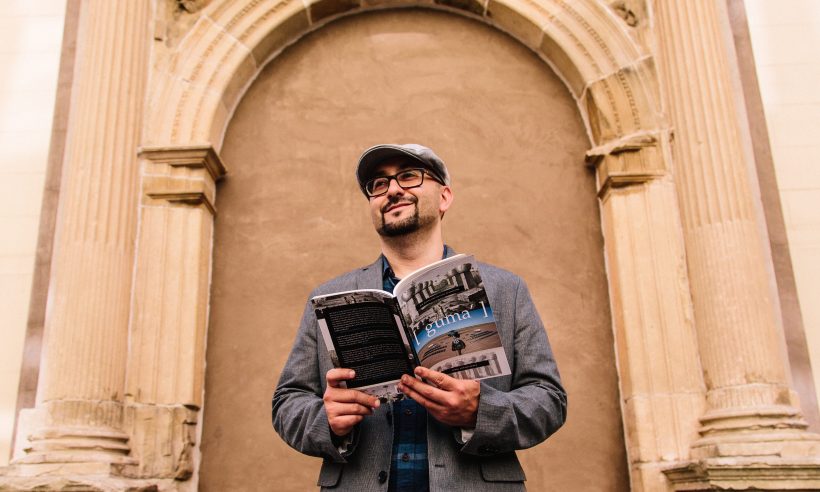What Do We Tell The Children? with Craig Santos Perez
In this episode of Climate Changed, Craig Santos Perez speaks with Ben Yosua-Davis in a moving conversation about raising children in a time of climate change. This tender, wide-ranging dialogue delves into questions of guilt, hope, and how to speak to young children about the beauty and brokenness of the world. Perez also reads two of his original poems, including “Thanksgiving in the Anthropocene” from his book of poetry Habitat Threshold, and listeners will hear the song Hymn for the Brave by Miles Avida. Following Ben’s conversation with Craig Santos Perez, he and Nicole Diroff will reflect, as parents of young children, on what is emerging and resonating for them before engaging listeners on next steps for finding hope in the midst of a climate-changed world.
About Craig Santos Perez
 Dr. Craig Santos Perez is an indigenous Chamoru from Guam. He is the co-editor of five anthologies and the author of five books of poetry and the academic monograph, Navigating Chamoru Poetry: Indigeneity, Aesthetics, and Decolonization. He holds an MFA in Creative Writing from the University of San Francisco and a PhD in Ethnic Studies from the University of California, Berkeley. He is a professor in the English department, and affiliate faculty with the Center for Pacific Islands Studies, at the University of Hawai'i at Manoa, where he teaches Pacific literature, creative writing, and eco-poetry.
Dr. Craig Santos Perez is an indigenous Chamoru from Guam. He is the co-editor of five anthologies and the author of five books of poetry and the academic monograph, Navigating Chamoru Poetry: Indigeneity, Aesthetics, and Decolonization. He holds an MFA in Creative Writing from the University of San Francisco and a PhD in Ethnic Studies from the University of California, Berkeley. He is a professor in the English department, and affiliate faculty with the Center for Pacific Islands Studies, at the University of Hawai'i at Manoa, where he teaches Pacific literature, creative writing, and eco-poetry.
Some Highlights from the Conversation
“Butterball, Butterball, Butterball,” a line from “Thanksgiving in the Anthropocene”
One of the major themes Craig writes about is food, as well as agriculture and food supply systems. “I think food is such a wonderful way for us to think about these larger issues and think about diet and the ethics of eating, the use of plastic and other packaging materials, the routes that the food takes to get to our plate, the animals that are slaughtered, as well as the workers who are often exploited.” The poem offers a searing commentary, but Ben notes, “However, there's also something incredibly playful about the poem in the reading.”
"What am I supposed to do with this damaged future that I'm giving them?" — Ben Yosua-Davis
Ben and Craig pull back the curtains on parenting and reveal their own fears and concerns about possibly sharing too much too soon with their young children. When and how do you tell your children that the more-than-human world they love is at great risk? When do you shelter a child with silence and when do you begin the conversation?
“...it gives them a space for creative expression and for healing.” — Craig Santos Perez
Craig talks about his university students and how writing poetry that takes on ecological disasters helps them come closer to the issues and find a path forward. Craig explains, “I've also noticed how, you know, once students learn about these issues, once they write their own poetry about what is happening, they're much more inclined to actually, you know, go to a beach cleanup, or to march in the climate change rally or to attend other environmental events.”
“Knowing how to grieve teaches us how to love.” — Nicole Diroff
Nicole Diroff joins Ben to discuss the themes that came up in the conversation. She explains the ways she talks to her eight-year-old, Elliot. “I've made a real commitment to finding the right language, because my child may be five, or six, or eight, or 12, to find the right language to have the conversation, but making sure that that my son knows that I'm the sort of person to talk about these topics with that I'm desiring to learn and live in this world at the same time that he is. It's really important with our children, and I say with our children, but I kind of mean just with other people to allow the space for authentic expression of emotion.”
Next Steps for Engaged Hope
- Even if we are not poets like Craig, it is always helpful to do creative work around these topics. I imagine there are listeners who will benefit from writing a poem about one of the topics that came up in the podcast. If you write the poem, you can share it with others through social media or face to face with family or friends. You can even send us a copy.
- Craig suggests, “Spend some time those dawn and dusk hours outside with loved ones, with a favorite beverage to really just be in that moment and to connect to the deeper spirit of things.”
- For any of you who are interested in playing with painting as compared to poetry, Nicole invites you to go to look at the Earthbound Practices on The BTS Center website. There you learn about the creativity practices, led by our friend Bronwen Mayer Henry, where she invites you to take out some colored pencils, or chalk, or pens, and play with a notebook.
- To check out more of Craig Santos Perez's work, you can visit his website. You will find links to his books, including Habitat Threshold, which was published in 2020. You can also see videos, read essays, and learn more about his research.


